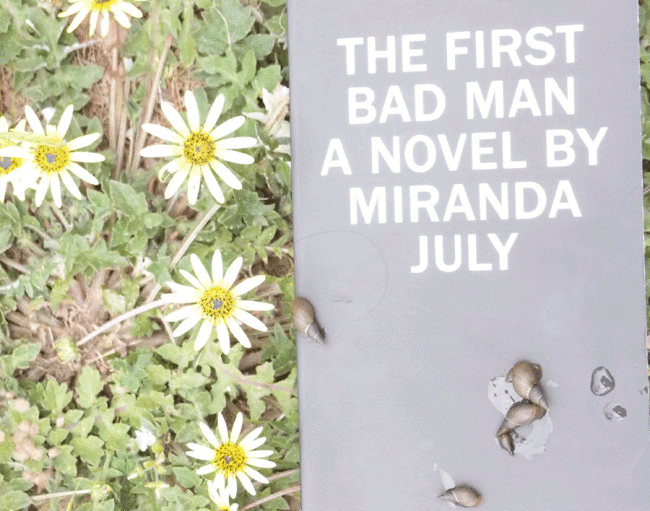A Novel by Miranda July
Published by Canongate Books, 2015
I’m going to start this review by saying things that may turn prospective readers away from The First Bad Man, but that is not my intention, so please bear with me.
Reading The First Bad Man felt a little like cleaning out my fridge. I was frequently disgusted, surprised by some of the content, but compelled by each disturbing discovery to keep going. Just like I can’t help lifting the lid on some mouldy mass in the bottom of my crisper to try and figure out what it is, I couldn’t help turning the pages of this book. A few chapters in I started to appreciate the deliciousness of what I was reading. If this book had a flavour it would be umami, that trendy new taste that Wikipedia says induces salivation and a sensation of furriness on the tongue, stimulating the throat and resulting in a lasting aftertaste that is difficult to describe.
The first chapter introduces the reader to Cheryl and her globus hystericus, an uncomfortable swelling in the throat that, at its worst, causes saliva to pool and requires frequent spitting because of an inability to swallow. I wanted to stop there – and I’m sure you want me to stop there – but Cheryl intrigued me, so I kept reading, and I’m glad I did.
In The First Bad Man Miranda July celebrates and denigrates human weirdness, revealing it as both frailty and conceit. She has created a small cast of characters that few would want to identify with but many would relate to.
Cheryl is middle-aged, lives alone, and is a long-time employee of ‘Open Palm’, a not-for-profit that teaches women’s self-defence and distributes role-play DVDs. She is awkward and submissive, and when the owners of Open Palm ask if their nineteen year old daughter, Clee, can stay with her for a while, she says yes, even though she’d like to say no.
The relationship between Cheryl and the selfish, oafish, bullying Clee, is the back bone of this story, and at times it is so repellent that all my instincts told me to look away, but I couldn’t. Other relationships in Cheryl’s life provide relief, of sorts. None of them are functional and most of them are strange – there’s a love interest, her accidental therapist, the enigma of her gardener and, most intriguing of all, the bond she has with Kubelko Bondy, the soul of a baby she loved as a child. These are bizarre relationships between seriously flawed individuals, but each reveals vulnerabilities and strengths – hers and theirs – that make this book quite extraordinary.
It’s difficult to say what this book is about without initially conjuring clichés – none of which apply. It is a coming of age story, but Cheryl is in her mid-forties; it’s a satire – and the narrative weaves-in all manner of Southern Californian bunkum, from re-birthing to chromotherapy (as if the essence of white can cure a fetid case of athletes foot) – but the emotion is recognisable and true; it’s sexually explicit, but not at all erotic; it’s a love story, but for much of the time I couldn’t help thinking I was reading a feminised version of Fight Club. In the end it’s about motherhood, although not as we commonly understand it. By this stage I was totally convinced, and deeply moved, by the authenticity of the fiction.
Miranda July has created a unique and subversive story that takes the characters, and the reader, on an absurd journey towards fulfilment. If at first you find it repulsive, hold your nose and keep reading.
Produced and recorded for Radio Northern Beaches, Sydney

